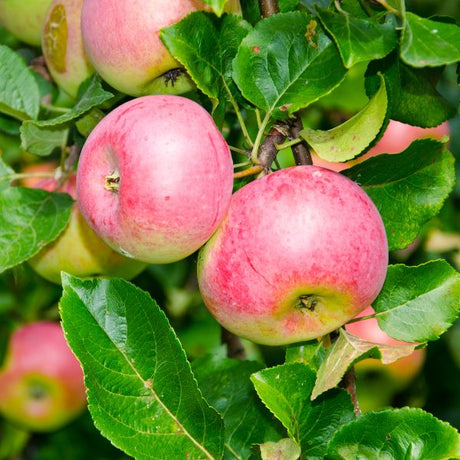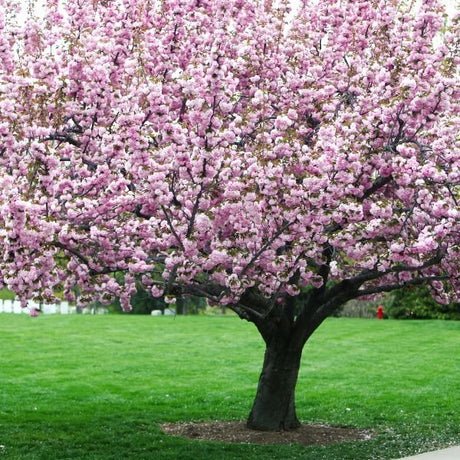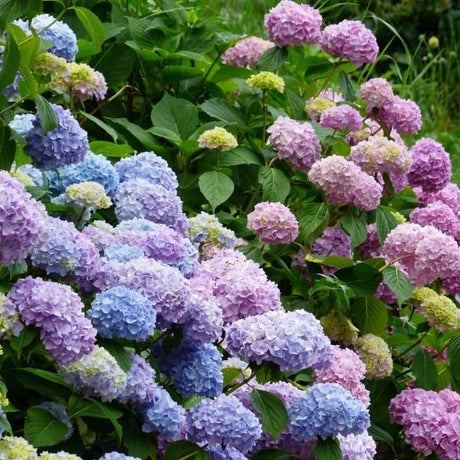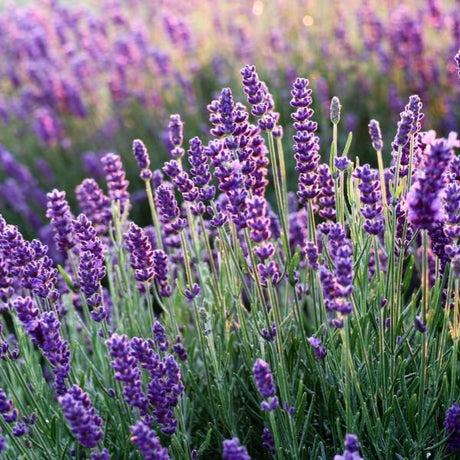Black Locust Tree
- Stay Protected with Plant Sentry ™
Black Locust Tree - #1 Container is backordered and will ship as soon as it is back in stock.
To receive an email notification when our next crop is ready, please enter your email below..*
Plant Sentry™
Plant Sentry™
Plant Sentry is designed to protect both consumers and the nursery trade from invasive plant pests and diseases. Sites that display the Plant Sentry protection badge are protected from consumers buying and nurseries shipping material carrying invasive pests and diseases.
This proprietary eCommerce software prevents the shipment of a restricted plant to each state. The Plant Sentry system includes a shipment certification program. The Plant Sentry Compliance Officer works closely with NatureHills.com and each nursery or fulfillment center to ensure only compliant plants are sold to customers.
Click Here to learn more

Delivery and Shipping
Delivery and Shipping
Shipping
To obtain a more accurate shipment time-frame, simply enter your zip code in the “Find Your Growing Zone” box to the right. Our plants are grown all over the country and lead time on items may be different because of this. Once your order is placed, you will also receive the specific shipment time-frame information as part of your order confirmation. Once an item ships, you will receive shipment notification and tracking numbers, so you can follow along while your plant travels to your doorstep. We use FedEx, UPS, or USPS at our discretion.
Due to winter weather we have put a hold on shipping to the areas shown below in grey. You can still order now and we will ship the plant to you during an appropriate time for your zone.
Standard Shipping Rates
At Nature Hills we handle, package and ship the products you order with the utmost care to ensure healthy delivery. Shipping and handling charges are calculated based on the tables below. Please note that some items include an additional handling surcharge, these will be noted on the item's product page.
| From | To | S&H |
|---|---|---|
| $0 | $19.99 | $24.99 |
| $20 | $49.99 | $29.99 |
| $50 | $69.99 | $34.99 |
| $70 | $99.99 | $39.99 |
| $100 | $129.99 | $44.99 |
| $130 | $149.99 | $48.99 |
| $150 | $150+ | Approx 28% |
Click here to see our full rates
Buying Options for Plants
Nature Hills sells a large variety of plants with several options available. Plants are offered in both potted containers and as dormant bare root without soil. Here is a helpful resource to understand your options as you create a beautiful landscape with help from Nature Hills.
Ever wonder what a larger plant will mean for your landscape? Container Sizes are really all about the age of the plant!
Seasonally, Nature Hills offers hand selected, high quality bare root trees, shrubs and perennials. Bare root plants are sold by height from the top of the root system to the top of the plant. Plants may be taller than the height minimums.
- Popular sizes of select trees are 1 foot, 2 feet, 3 feet, etc.
- Popular sizes of select bare root plants is 1 foot, 18 inches, etc.
Nature Hills Container Size by Volume
Keep in mind, specific varieties and different growing conditions can affect the rate at which plants grow. Variations in size may occur.
| Young Plants to 18 Months | ||
|---|---|---|
| Size | Volume | |
| 2"x2"x3" | Ranges from | .18 to .21 dry quarts / .198 to .23 dry liters in volume |
| 4.5" Container | Equal to | .65 dry quart / .72 dry liter in volume |
| Sprinter Pot | Equal to | .63 dry quart / .69 dry liter in volume |
| 4" Container | Ranges from | .31 to .87 / .35 to .96 dry liter in volume |
| 6" Container | Equal to | 1.4 dry quarts / 1.59 dry liters in volume |
| 1 Quart | Equal to | 1 dry quart / 1.1 dry liter in volume |
| 5.5" Container | Equal to | 1.89 of a dry quart / 2.08 dry liters in volume |
| 4"x4"x5" | Ranges from | .8 to 1.1 dry quarts / .88 to 1.2 dry liters in volume |
| 4"x4"x6" | Ranges from | 1.0 to 1.3 dry quarts / 1.1 to 1.41 dry liters in volume |
| 4"x4"x9" | Ranges from | 1.1 to 2.1 dry quarts / 1.2 to 2.3 dry liters in volume |
| 4"x4"x10" | Ranges from | 1.7 to 2.3 dry quart / 1.87 to 2.53 dry liters in volume |
| Plants 18 Months - 2.5 Years Old | ||
|---|---|---|
| Size | Volume | |
| 2 Quart | Equal to | 2 dry quarts / 2.2 dry liters in volume |
| #1 Container | Ranges from | 2.26 to 3.73 dry quarts / 2.49 to 4.11 dry liters in volume |
| 5"x5"x12" | Equal to | 3.5 to 4.3 dry quarts / 3.85 to 4.74 dry liters in volume |
| Plants 2 - 4 Years Old | ||
|---|---|---|
| Size | Volume | |
| #2 Container | Ranges from | 1.19 to 1.76 dry gallons / 5.24 to 7.75 dry liters in volume |
| #3 Container | Ranges from | 2.32 to 2.76 dry gallons / 10.22 to 12.16 dry liters in volume |
| Plants 3 - 5 Years Old | ||
|---|---|---|
| Size | Volume | |
| #5 Container | Ranges from | 2.92 to 4.62 dry gallons / 12.86 to 20.35 dry liters in volume |
| #6 Container | Ranges from | 5.25 to 6.01 dry gallons / 23.12 to 26.42 dry liters in volume |
| #7 Container | Ranges from | 5.98 to 6.08 dry gallons / 26.34 to 26.78 dry liters in volume |
Plant Highlights
Black Locust Tree highlights at a glance!
Plant Highlights
Plant Highlights
-
Brand
-
Botanical Name
-
Growing Zones
-
Mature Height
-
Mature Spread
-
Sun ExposureFull Sun
-
Moisture
-
Soil
-
Growth RateFast
-
Flower Color
-
Fall Color
-
Pollinator Friendly
-
Fragrant
-
Pruning Time
-
Bloom PeriodEarly Spring
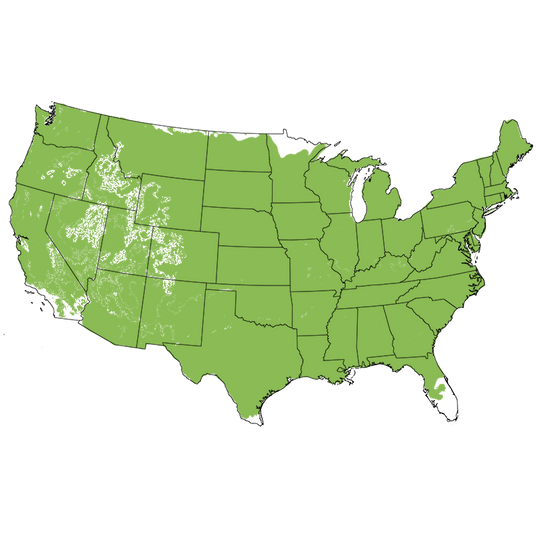
Growing Zones 4-9
Farmers, homesteaders, and entrepreneurs take note! This native hardwood tree has many valuable uses as a cash crop, as an edible ornamental (flower fritters!), honey, and gorgeous shade tree! The Black Locust Tree (Robinia pseudoacacia) features white fragrant spring flowers and a fast-growing open, airy canopy is a big bonus!
Native to the Appalachian Mountains of North America, this deciduous tree grows quickly in a wide range of climates, and soil types. As a legume family member, Locust Trees will fix nitrogen in the soil, which helps improve poor soils.
There aren't many trees as tough as this one! Black Locust is so hardy that it will not only tolerate difficult conditions but thrive in them. It's extremely adaptable to almost any soil type. It grows in either wet or dry soils. Try this tree for locations where other trees may have failed. It's tolerant of urban pollution and is drought and cold hardy.
Each spring, the Black Locust produces incredibly fragrant, long, hanging white flowers that look like Wisteria, and smell like heaven. They'll also attract honey bees and hummingbirds.
Handsome foliage quickly fills out to provide dappled shade for the summer months. You can grow warm-season turf right up to the trunk The matte green, wide, rounded leaflets on a pinnately compound leaf turn a pretty yellow in fall. Because each leaflet is small, fall clean-up is a snap!
Planting and Application:
The Black Locust has many applications in the landscape including as a fast-growing shade tree, border plantings, and erosion control. The tree's ability to satisfy these applications quickly makes it highly desirable.
It can also be grown as a cash crop!
Extremely hard wood is great for lumber and flooring planks. Rot-resistant, straight trunks make valuable poles. High-density wood is an ideal material for decks, outdoor furniture fence posts, and other projects that require weatherproof materials. This strength holds up in ice and heavy snow, storms and wind.
Black Locust logs make excellent firewood. They split easily, burn hot, and easily create an effective bed of coals. Grow a stand just for fuel, but be warned! You may go through several chains on your saw cutting these hard trees up. The results will be worth it.
And that's not all!
The delicious honey sourced from Black Locust is commonly referred to as Acacia Honey. It's very light in color and beautifully translucent. Delicate, fruity, floral fragrance and sweet taste add to the appeal. It's a great honey for children over the age of 1 because of the high fructose levels. They'll love that sweet, natural taste!
Why not set up a managed grove of Black Locusts to support beehives? People love buying local honey at Farmer's Markets and online. Use the Locust Tree honey in tea, sweetening food, skincare, and other holistic products.
For managed crops, consider rotating out the trees every 10 years. Coppice firewood trees to the ground.
Don't plant a grove near corrals, barns, or pastures frequented by cattle or horses. Do your research before you consider using Locusts as fodder or mast for deer hunting.
- Beautiful Light Green Oval Leaflets
- Grows Quickly & Low-Maintenance
- Rot Resistant Hardwood & Open Airy Canopy
- Fragrant White Spring Flowers - Fantastic Honey Tree
- Erosion Control, Shade, Specimen & Flowering Ornamental
#ProPlantTips for Care:
Plant native Black Locust Trees in full sun and in well-drained soil of almost any kind. New trees need regular moisture, but once established, Locust trees are drought-tolerant and easy to grow. Prune if needed after flowering to shape young trees.
If used in a home landscape, it's best used as a shade tree with a lawn under it. Plan to mow regularly all around the tree. Regular mowing will help manage this vigorous tree. Otherwise, to help keep the trunk from getting gouged by weed-whackers and mower damage, add a 3-4 inch deep layer of arborist mulch extending out several feet from the trunk.
Nature Hills uses an online database called Plant Sentry™. We follow all federal, state, and local restrictions for sale if this tree is a concern in your area.
- Full Sun Deciduous Trees
- Highly Adaptable to Any Well-Drained Soil
- Moderate to Low Moisture Needs Once Established
- Prune After Flowering
- Incredibly Hardy & Tough as Nails
The Black Locust Tree is a fast-growing, hardy tree with incredible ornamental features. Plant one today and begin enjoying its rare and unique features. Manage it carefully and enjoy the profits from this valuable native plant.



